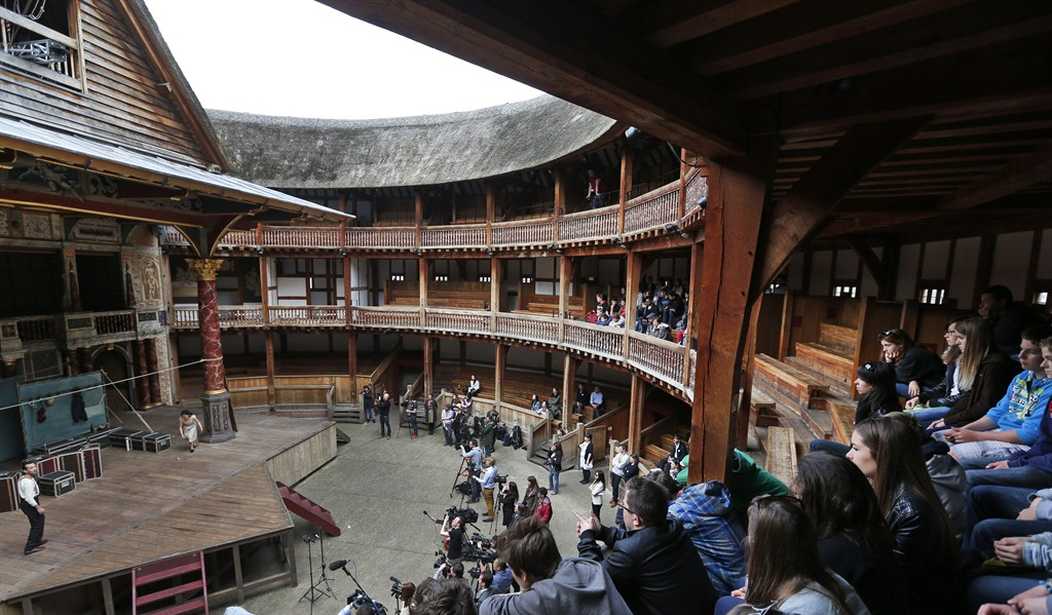Top News
Is it time to cancel Shakespeare?

Yesterday the Post published a story about the author of a new book titled “The Great White Bard.” The story isn’t a book review it’s more of a profile but the gist seems to be that we need to destroy Shakespeare in order to save him. The piece opens on complaints that the indoor theater adjoining the Globe in London is problematic for actors of color.
…the Sam Wanamaker Playhouse, as it’s officially known, is sometimes too dark, especially for the actors of color who are increasingly cast in major roles onstage.
“It really places them at a disadvantage because they can’t be seen,” said Farah Karim-Cooper, seated in the playhouse’s pit…
A decade ago, she advised the indoor theater’s design based on Jacobean architectural tradition. But during the Globe’s first Shakespeare and Race Festival, which she organized in 2018, she hosted a workshop in the theater with actors of color and learned how they were disadvantaged by some of the set and lighting design decisions.
“What we have proved subsequently is that it does not work for actors of the global majority,” she said, using the Globe’s preferred language to describe actors of color. “It feels like a space of empire.”
A space of empire? What does this even mean? I’ve been to the Globe and seen a show there but never to the indoor theater. Apparently, it relies on candles to provide the lighting, or at least it did when it opened.
The Wanamaker keeps around 2,000 candles in store, but that’s hardly a fortnight’s supply. For each comedy or tragedy, opera or recital, more than 100 are lit in the chandeliers or on the bronze sconces strapped to pillars. They’re the lighting, the setting, the special effects; they can edit a production into cinematic noir, or party up an evening into conviviality. Very slowly, their honeyed smell and invisible smoke pervades the unvarnished oak and pine of the wooden casket that is the Wanamaker. Everything about the Wanamaker is experimental, and the candles are downright edgy.
Presumably any indoor theater with insufficient lighting would be a place where it was harder to see the faces of dark-skinned actors. To be clear, I’m all for giving good actors good roles regardless of race, but can’t we solve this problem with some subtle, supplemental electric lighting? What is the point of imputing some kind of colonial intent to what should be a fairly minor problem? I guess the point is that this is just how Karim-Cooper wants us to see the world.
Although Karim-Cooper’s new book tackles a long-standing scholarly question, it is remarkable for its accessibility, both to nonspecialist readers and to those who find themselves more invested in today’s politics than those of early English modernity. She anchors her claims to current events, bolstering arguments about Shakespeare being hijacked by White nationalists with a reference to a little-known letter sent by American far-right extremists to Washington’s Folger Shakespeare Library ahead of the Jan. 6, 2021, insurrection, reassuring the library that the mob had “no intention of damaging, trespassing, or otherwise altering your facility in anyway” during the violent events. And Karim-Cooper compares former president Barack Obama’s perceived proximity to Whiteness — and the ensuing respect he earned from both liberals and conservatives — to Othello’s ability to negotiate White spaces.
For her, these comparisons aren’t ahistoric but necessary if we’re to combat Bardolatry — the uncritical adulation of Shakespeare. “If you are going to hail a writer from 400 years ago as the greatest writer of all time,” she said, “then you need to look at him in relation to the contemporary moment. Because the moment you don’t do that, he can be bracketed from it all and just kept on his pedestal.”…
“I don’t want to think that he was racist,” she said, adding that she wonders whether her mind is “fully decolonized” in admitting this.
Good grief. She’s doing her best to sound measured but the trend of leftist re-examination of historical figures only ends one way. It’s not just Thomas Jefferson the left wants to denounce using these critical tools, it’s Abraham Lincoln as well. Sooner or later the woke critics come for everyone whether living or dead.
I was somewhat surprised to see so many Post commenters sounding a bit tired of this game:
So, William Shakespeare isn’t politically correct????? Oh, forcrissake, give it a break!
Another:
Stop. Please, just stop.
The last three Shakespeare productions I’ve seen have been cross gendered and re-imagined racially. There’s nothing novel in it anymore. If I wanted to be lectured I’d go see my mother.
This may be my favorite:
Were the protagonist of this story not so obviously in earnest, I should have thought it a satire on the racial preoccupations of today’s humanities ‘scholars’.
Surely it has occurred to Ms. Karin-Cooper that Shakespeare, and every other British Elizabethan era writer, lived in a racially homogenous island nation with quite limited exchange with Africa, the Middle East or Asia, nor of course the Americas. Like cultural figures of any vintage, these writers were embedded in, and products of, the cultural and intellectual settings of their time. And in that time, people from distant lands, distinguished by race, by religion, by language, or by dietary custom from the British were exotic, and represented as such in art and literature.
I do not think that Shakespeare had a “race problem”. Today’s race-obsessed academy, alas, is another matter.
But this isn’t bad either:
Oh, for crying out loud. Retired English literature teacher here. Of course Shakespeare has a “race problem.” And?? Honestly, this is the sort of BS that ensures liberals will never shed their “woke” albatross.
I am cherry-picking but at the moment there are only 66 comments and this seems to be the tone of quite a number of them.
Read the full article here


















